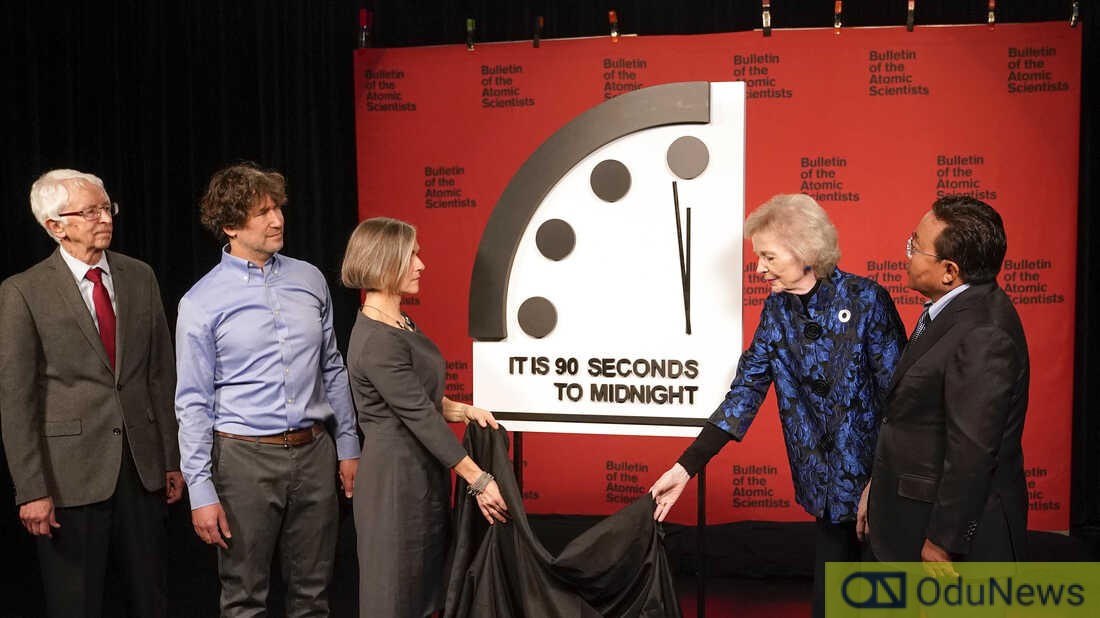[ODUNEWS] January 24 – The Bulletin of Atomic Scientists said on Tuesday that Russia’s conflict in Ukraine has dramatically increased the chance of global self-annihilation, bringing the Doomsday Clock closer to midnight than ever before.

According to the Bulletin of Atomic Scientists, the Doomsday Clock is a sign that depicts the possibility of a man-made global disaster. The clock, which has been running since 1947, is a symbol of the dangers that unregulated scientific and technological developments pose to humanity.
The Bulletin’s judgement on how near the world is to a potential global disaster is symbolised by a set number of minutes or seconds to midnight, which is appraised in January of each year. Nuclear danger and climate change are the two most important elements altering the clock.
The Doomsday Clock was created to urge world leaders to recommit to solving extinction-level concerns, such as the prospect of nuclear weapons use, but it has since expanded to encompass the perils of the climate crisis and biological hazards, such as the COVID-19 pandemic.
The clock has advanced to 90 seconds before midnight, which is 10 seconds closer than it was in January 2022, soon before Russia started its invasion of Ukraine on February 24. “Truly catastrophic catastrophes are more likely if rapid and targeted action is not taken,” Rachel Bronson, president and CEO of the Bulletin of Atomic Scientists, warned Tuesday. The Bulletin of Atomic Scientists has already opposed Russia’s invasion of Ukraine, calling Russian President Vladimir Putin’s statements on nuclear weapons to use “outrageous.”
“The prospects that the confrontation may spiral out of anyone’s control remain high,” Bronson cautioned, referencing UN Secretary-General Antonio Guterres’ earlier warning that the world has entered a period of nuclear risk unseen since the Cold War’s height. The Bulletin of Atomic Scientists’ decision came on the same day that the US Ambassador to the United Nations Conference on Nuclear Disarmament criticised Russia for postponing strategic nuclear negotiations between Washington and Moscow aimed at decreasing nuclear arms for the second time. Russia has already stated that it would postpone the meeting to discuss US assistance to Ukraine.
Former global leaders and scientists spoke out in favour of continuing to arm Ukraine when asked by a Russian reporter Tuesday how nuclear discussions between Washington and Moscow can restart while the US and other Western nations contemplate deploying tanks and long-range weaponry to Ukraine. “I believe they need more tanks,” stated Elbegdorj Tsakhia, former president and prime minister of Mongolia and former prime minister of Ukraine. “They don’t have time to waste.” “I believe they require further assistance.” “More armaments, more tanks.” According to Steve Fetter, a professor of public policy at the University of Maryland and a member of the Bulletin of Atomic Scientists, the United States and Russia should be able to continue nuclear discussions despite the conflict in Ukraine, “as we did through the darkest days.”
“If Russia wins in Ukraine, other non-nuclear nations may conclude that they cannot be safeguarded against nuclear-armed opponents, undermining the Non-Proliferation Treaty and fueling a new cycle of proliferation,” he warned. Other global issues, such as climate change and biological risk, have been exacerbated by Russia’s war in Ukraine. The Bulletin of Atomic Experts published its results for the first time in English, Russian, and Ukrainian, with the purpose of having it read in the capitals most affected, according to the consortium of scientists. Suzet McKinney, principal and director of life sciences at Sterling Bay University and a member of the Bulletin of the Atomic Scientists, has warned of both natural and man-made biological hazards.
She cautioned that Russia, North Korea, and Iran all have biological weapons programmes, and that the possibility of Russia using deadly weapons in Ukraine “continues to rise as events there get more and more chaotic.” ” McKinney stated that three years into the COVID-19 pandemic, the world community has to increase its ability to avoid disease outbreaks and detect them rapidly when they arise, both from illness originating in animals and transferred to people and laboratory mishaps.
“Events like COVID-19 may no longer be regarded as uncommon, once-in-a-century events,” she added. According to Sivan Kartha, a senior scientist at the Stockholm Environmental Institute, Russia’s invasion of Ukraine has contributed to two conflicting processes in terms of climate change.
The push to decouple from Russia’s oil and gas exports has boosted renewables investment, but high natural gas prices have “driven a frenzied push to develop new natural gas supplies” and a short-term reliance on coal in power plants, “leading this past year to be a record high for global coal consumption,” Kartha said. In his final remarks, Bronson stated that the clock approaching midnight sends a message to the people to put additional pressure on authorities to confront these deadly hazards.
“We’re in a scenario today where leaders aren’t doing what they need to do, and we badly need the people to make sure they’re focusing on essential problems,” she added. “Those who are paying attention remark, “It doesn’t seem safer today,” and they’re not alone. We’re very concerned about this. No one can do this alone, but everyone can do something. And with that, we hope that the moving of the clock as we assess where the threats are is a motivator that we all need to pay attention to these key issues.”


Comments are closed.